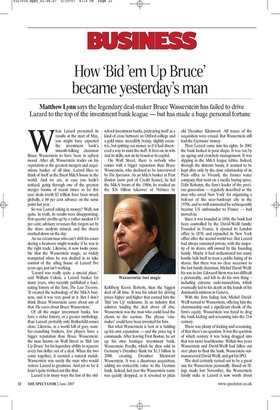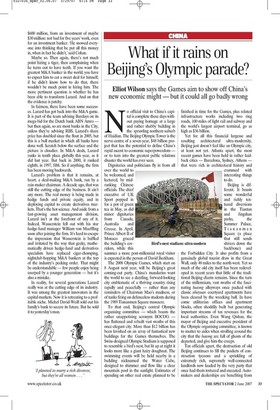How 'Bid 'em Up Bruce' became yesterday's man
Matthew Lynn says the legendary deal-maker Bruce Wasserstein has failed to drive Lazard to the top of the investment bank league — but has made a huge personal fortune Ivhen Lazard presented its results at the start of May, you might have expected the investment bank's smooth-talking chairman Bruce Wasserstein to have been in upbeat mood. After all, Wasserstein trades on his reputation as the greatest mergers and acquisitions banker of all time. Lazard likes to think of itself as the finest M&A house in the world. And we are, in case you hadn't noticed, going through one of the greatest merger booms of recent times: so far this year deals worth $2 trillion have been struck globally, a 60 per cent advance on the same point last year.
So was Lazard raking in money? Well, not quite. In truth, its results were disappointing: first-quarter profits up by a rather modest 4.9 per cent; advisory revenues flat; targets set by the share analysts missed; and the shares marked down on the day.
An ice-cream man who can't shift his cones during a heatwave might wonder if he was in the right trade. Likewise, it now looks possible that the Wasserstein magic, so widely trumpeted when he was drafted in to take control of the ailing house of Lazard five years ago, just isn't working.
'Lazard was really quite a special place,' said William Cohan, a Lazard banker for many years, who recently published a fascinating history of the firm, The Last Tycoons. 'It created the technology of the M&A business, and it was very good at it. But I don't think Bruce Wasserstein cares about any of that. He cares about Bruce Wasserstein.'
Of all the major investment banks, few have a richer history, or a greater mythology, than Lazard: probably only Rothschild comes close. Likewise, in a world full of grey, number-crunching bankers, few players have a bigger reputation than Bruce Wasserstein: the man known on Wall Street as 'Bid 'em Up Bruce' for his legendary ability to squeeze every last dollar out of a deal. When the two came together, it seemed a natural match. Wasserstein was surely the man who would restore Lazard to greatness. And yet so far it hasn't quite worked out like that.
Lazard is in many ways the last of the old32 THE SPECTATOR 2 June 2007 school investment banks, portraying itself as a kind of cross between an Oxford college and a gold mine: incredibly brainy, slightly eccentric, but spitting out money as if it had discovered a way to mint the stuff. It lives on its wits and its skills, not on its brand or its capital.
On Wall Street, there is nobody who comes with a bigger reputation than Bruce Wasserstein, who declined to be interviewed by The Spectator. As an M&A banker at First Boston (now part of Credit Suisse), he led the M&A boom of the 1980s; he worked on the $26 billion takeover of Nabisco by Kohlberg Kravis Roberts, then the biggest deal of all time. It was his talent for driving prices higher and higher that earned him the 'Bid 'em Up' nickname In an industry that admires landing the deal above all else, Wasserstein was the man who could lead the clients to the auction. The phrase 'rainmaker' could have been invented for him But what Wasserstein is best at is bidding up his own reputation — and the price tag it commands After leaving First Boston, he set up his own boutique investment bank, Wasserstein Perella, which he then sold to Germany's Dresdner Bank for $1.3 billion in 2000, creating Dresdner Kleinwort Wasserstein. It was a disastrous acquisition, adding no noticeable value to the German bank. Indeed, last year the Wasserstein name was quietly dropped, as it reverted to plain old Dresdner Kleinwort. All traces of the acquisition were erased. But Wasserstein still had the Germans' money.
Then Lazard came into his sights. In 2001 the bank looked in poor shape. It was run by an ageing and crotchety management. It was slipping in the M&A league tables. Indeed, through the dotcom boom, it seemed to be kept alive only by the close relationship of its Paris office to Vivendi, the former water company that went on a media buying spree. Felix Rohatyn, the firm's leader of the previous generation — regularly described as `the man who saved New York' for organising a bail-out of the near-bankrupt city in the 1970s, and so well-connected he subsequently became US ambassador to France — had moved on.
Since it was founded in 1848, the bank had been controlled by the David-Weill family. Founded in France, it opened its London office in 1870, and expanded its New York office after the second world war. But Lazard had always remained private, with the majority of its shares still owned by the founding family. Maybe it had orchestrated too many hostile bids itself to trust a public listing of its shares. But there was no clear successor to the last family chairman, Michel David-Weill: his son-in-law Edouard Stern was too difficult a personality, and left to do his own thing – including extreme sado-masochism, which eventually led to his death at the hands of his dominatrix mistress in Geneva.
With the firm fading fast, Michel DavidWeill turned to Wasserstein, offering him the chairmanship and a significant chunk of the firm's equity. Wasserstein was hired to drag the bank kicking and screaming into the 21st century.
There was plenty of kicking and screaming, of that there's no question. It was the question of which century it was being dragged into that was more troublesome. Within two years Wasserstein and David-Weill had fallen out over plans to float the bank. Wasserstein outmanoeuvred David-Weill, and got his IPO.
The deal certainly turned out to be a great one for Wasserstein personally. Based on filings made last November, the Wasserstein family stake in Lazard is now worth about $600 million, from an investment of maybe $30 million not bad for five years' work, even for an investment banker. 'He snowed everyone into thinking that he put all this money in, when in fact he didn't,' said Cohan.
Maybe so. Then again, there's not much point hiring a tiger, then complaining when he turns out to have teeth. If you want the greatest M&A banker in the world, you have to expect him to cut a sweet deal for himself; if he didn't know how to do that, there wouldn't be much point in hiring him. The more pertinent question is whether he has been able to transform Lazard. And on that the evidence is patchy.
In fairness, there have been some successes. Lazard has got back into the M&A game. It is part of the team advising Barclays on its mega-bid for the Dutch bank ABN Amro — but then again, so are most banks in the City, unless they're advising RBS. Lazard's share price has doubled since the float in 2005, but this is a bull market in which all banks have done well. Scratch below the surface and the picture is cloudier. In M&A deals, Lazard ranks in tenth place globally this year, as it did last year. But back in 2000, it ranked eighth; in 1997, fifth. So if anything, the firm has been moving backwards.
Lazard's problem is that it remains, at heart, a deal-making M&A bank, run by a rain-maker chairman. A decade ago, that was still the cutting edge of the business. It ain't any more. The real money is being made in hedge funds and private equity, and in deploying capital to create derivatives markets. That's the hot science. And aside from a fast-growing asset management division, Lazard isn't at the forefront of any of it. Indeed, Wasserstein fell out with his star hedge-fund manager William von Mueffling soon after joining the firm. It's hard to escape the impression that Wasserstein is baffled and irritated by the way that geeky, mathematically driven hedge-fund and derivatives specialists have replaced cigar-chomping, nightclub-hopping M&A bankers at the top of the industry's pecking order. That might be understandable — few people enjoy being usurped by a younger generation — but it's also a mistake.
In reality, for several generations Lazard really was at the cutting edge of its industry. It was among the greatest innovators in the capital markets. Now it is retreating to a profitable niche. Michel David-Weill sold out his family's bank to secure its future. But he sold it to yesterday's man.





















































 Previous page
Previous page